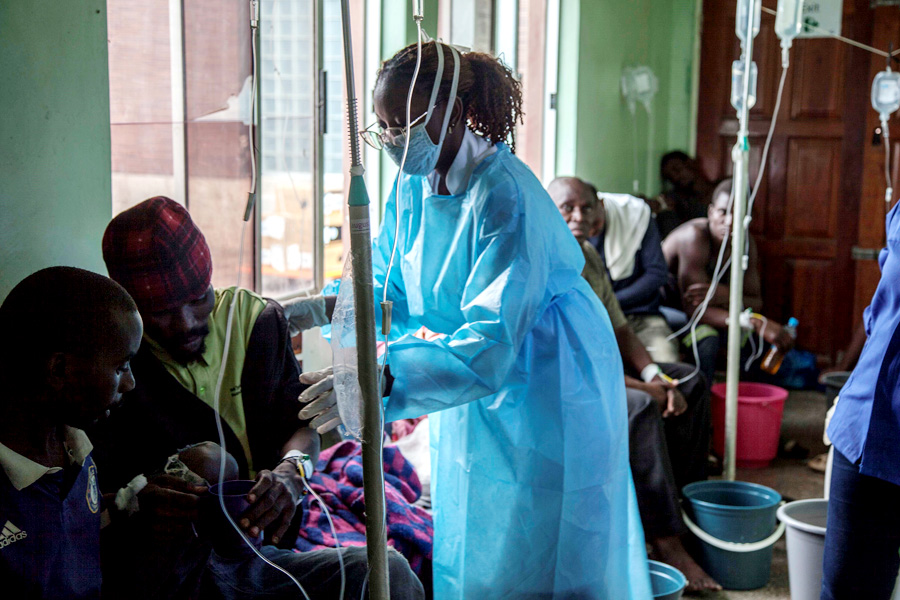Uganda govt makes strides but cholera always still one bad water away

Cholera remains a significant public health challenge in Uganda, where periodic outbreaks of the acute diarrheal disease occur.
By Veronica Baba
In a country where hundreds of communities still share valley dam water with livestock, to say cholera is always lurking is an understatement even as the government, along with its development partners, continue to make inroads in reducing the disease burden and limiting its occurrence.
Cholera remains a significant public health challenge in Uganda, where periodic outbreaks of the acute diarrheal disease occur. Caused by the bacterium vibrio cholerae, cholera can lead to severe dehydration and death if untreated.
Uganda has experienced recurrent cholera outbreaks for decades, often triggered by rainy seasons that facilitate the contamination of water sources. High population density, especially in urban slums and refugee settlements, exacerbates the spread of the disease.
As recently as in February, an outbreak of the disease was reported in Bukasakya, a community in Mbale City in eastern Uganda. Mbale City Health Officer Moses Mugonyi confirmed two cases of cholera and the death of a 119-year-old girl from the waterborne disease that was said to have been due to contamination of adjacent stream through the disposal of 'flying toilets' - unhygienic phenomenon of defecating in kaveera and the excrement is then disposed of in the bushes.
On July 19, 2023, the Uganda Ministry of Health declared a cholera outbreak in Kayunga District following death of four family members within eight days and confirmation of Vibrio cholerae by culture.
Several factors contribute to the persistence of cholera in Uganda. Limited access to clean water and inadequate sanitation infrastructure are primary drivers. Many communities rely on contaminated water sources for drinking, cooking, and washing. Additionally, poor hygiene practices, such as lack of handwashing, facilitate the transmission of the bacteria.
Socio-economic conditions in Uganda also play a significant role in the persistence of cholera. Poverty limits individuals' ability to access healthcare and clean water, complicating outbreak management.
During outbreaks, the health system often becomes overwhelmed, leading to delayed and insufficient responses. Natural disasters, such as floods, can destroy water and sanitation infrastructure, creating ideal conditions for cholera to spread.
The Ugandan government, with support from development partners such as the World Health Organization (WHO) and UNICEF, has implemented several measures to combat cholera. These include emergency vaccination campaigns, provision of clean water, and public health education initiatives aimed at promoting hygiene practices. Surveillance systems have also been strengthened to detect and respond to outbreaks more swiftly.
Despite these efforts, challenges remain. Ensuring sustained access to clean water and improving sanitation infrastructure require substantial investment and political will.
However, in the Financial Year 2024/25 Budget, the government said more of its population now have access to safe clean water. Coverage in rural areas is now estimated at 67 percent, and 73 percent in urban areas, Finance and Economic minister Matia Kasaija said while presenting the Budget.
Out of 71,225 villages, 56,617 villages have been served with at least one safe water source, Kasaija added.
"In FY2024/25, clean water coverage will increase to 70 percent and 85 percent in rural and urban areas, respectively," the minister said.
"In the rural areas, the target is to reduce the distance to the nearest source of clean and safe water for human and animal consumption to less than one kilometre while in urban areas to less than 500 metres.
The government said to further enhance the health of Ugandans, a total of Shs2.946 trillion has been provided next financial year 2024/25. Uganda will focus on promotion and implementation of interventions for the disease prevention and health education initiatives against communicable, non-communicable and neglected tropical diseases and injuries
But beyond the money matter and how it is to be used to impact the health of Ugandans, behavioral change campaigns must be continuous and culturally sensitive to be effective. Addressing the underlying socio-economic determinants of health is crucial for long-term success.
Cholera in Uganda is a multifaceted problem that requires a comprehensive approach. While significant progress has been made in managing outbreaks, a concerted effort involving government, international partners, and local communities is essential to eliminate the disease and prevent future outbreaks. By improving water and sanitation infrastructure, enhancing public health education, and addressing socio-economic inequalities, Uganda can move closer to a cholera-free future.














